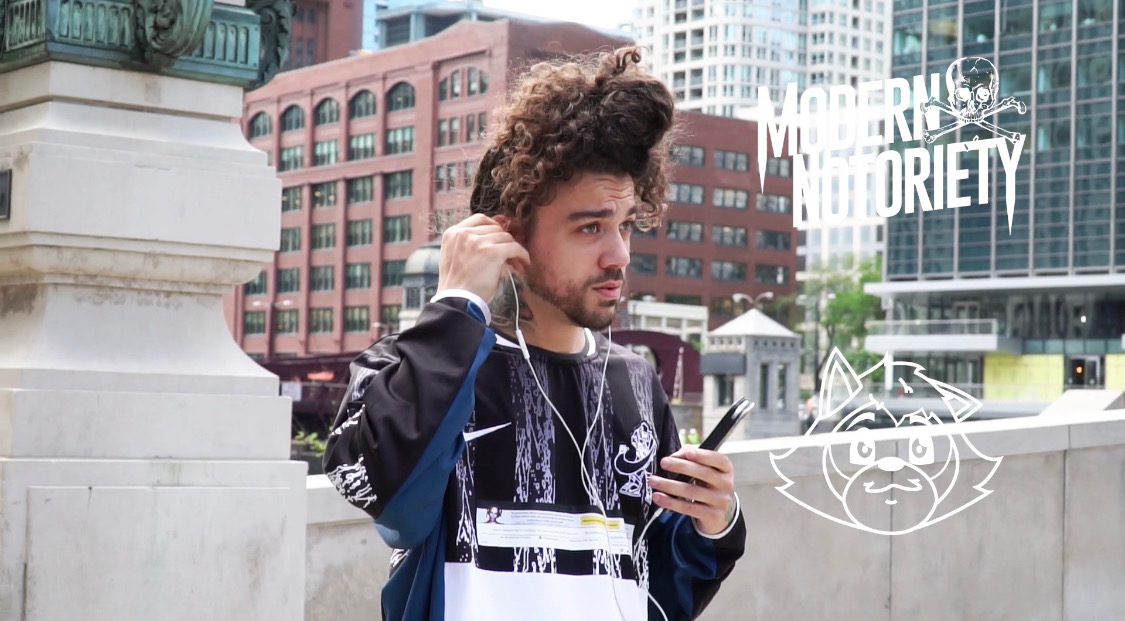
In a city where violence and corruption constantly make headlines resides Ali Six, the Chicago-based street artist known for his cartoon mascot, Richie The Raccoon. Through vibrants colors and nostalgic references, Ali Six provide a sense of optimism and positivity to the communities that are blessed with his murals and wheat pastes.
Richie The Raccoon serves as one of the ways that Ali Six expresses himself. Richie is often dressed in outfits that showcase the artist’s interests and passions, which include ’90s cartoons, hip-hop, and video games.
Another major creative outlet for Ali Six is skateboarding. Watch Ali Six in action in the video below and scroll further down to read our interview with Ali Six.
MN: What kind of work do you do and what mediums do you use?
Ali Six: The work I do would be considered street because I use the streets for advertising and marketing. That’s why I’m labeled as a street artist, but I see myself more as an outside-of-the-box artist. Whenever I’m doing art, I try to challenge myself to do something that’s more complicated for me to do. So if I’m used to using spray paint and I’m gonna have a gallery show, I’m probably going to use a plethora of mediums just so that its not as easy to create pieces for the whole thing. It gives people that kind of “wow” factor when they’re viewing my work.
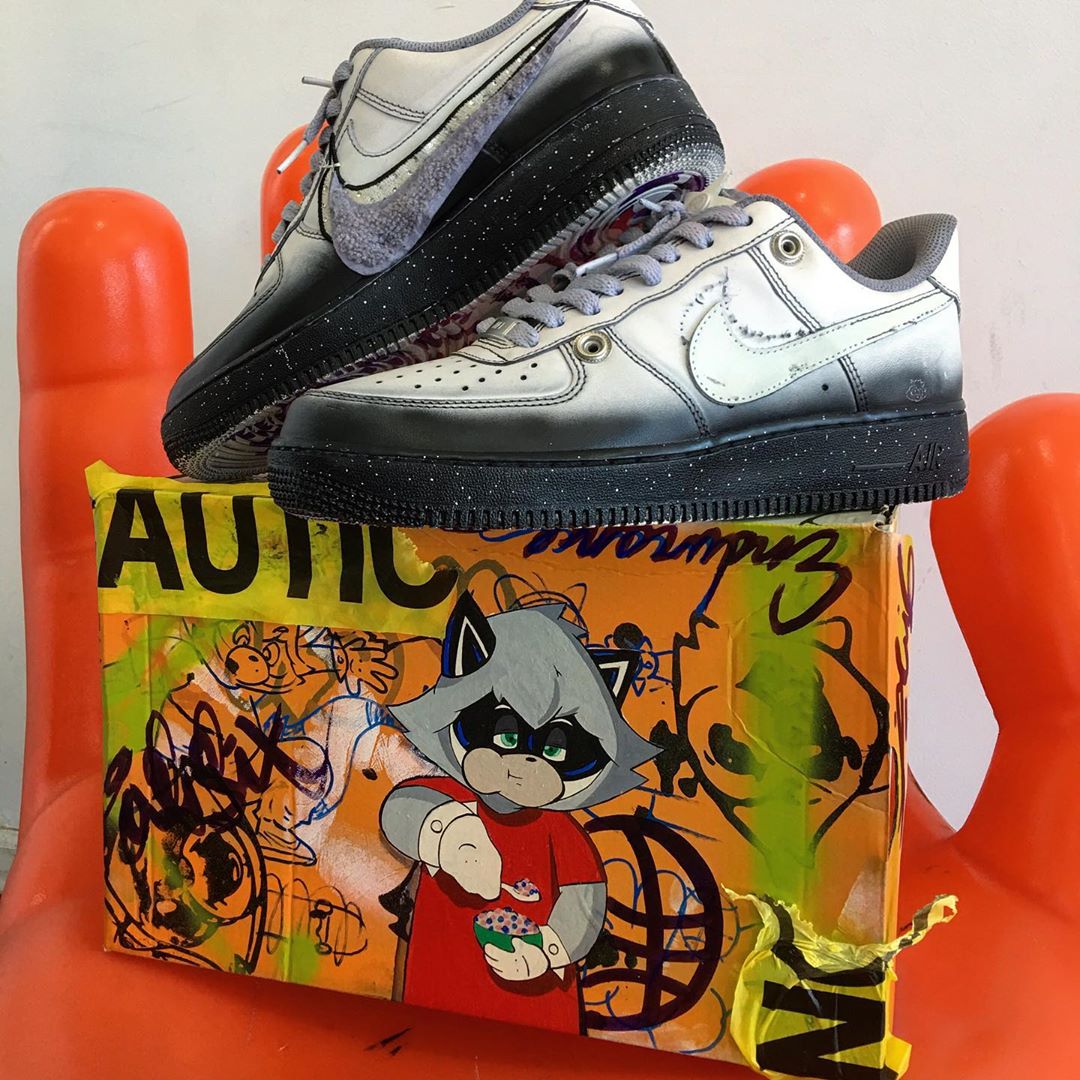
MN: How did graffiti help you build your career?
Ali Six: So when I was 5 I started drawing and then in high school I got into graffiti. I could draw cartoons by the time I got into high school, but then I learned about letters. I thought it would be the same learning curve, but it’s totally different learning how to draw letters. The art of typography is way different. So I mustered up the ability and was able to hone that skill after a couple years. I excelled in graffiti and became one of the kings of the North Side/Bucktown/Logan Square/Blue Line area.
With it came a lot of negativity as well. I started racking, stealing a bunch of paint, stealing a bunch of gear… you know, it just comes along with the culture of graffiti. After getting arrested 6 times, I wanted to transition into an art that’s more of a career, but still had the same aesthetics. So I kind of combined my love for drawing with the skills I learned through graffiti: color coordination, color theory, how to use spray paint, and the marketing that comes with graffiti.
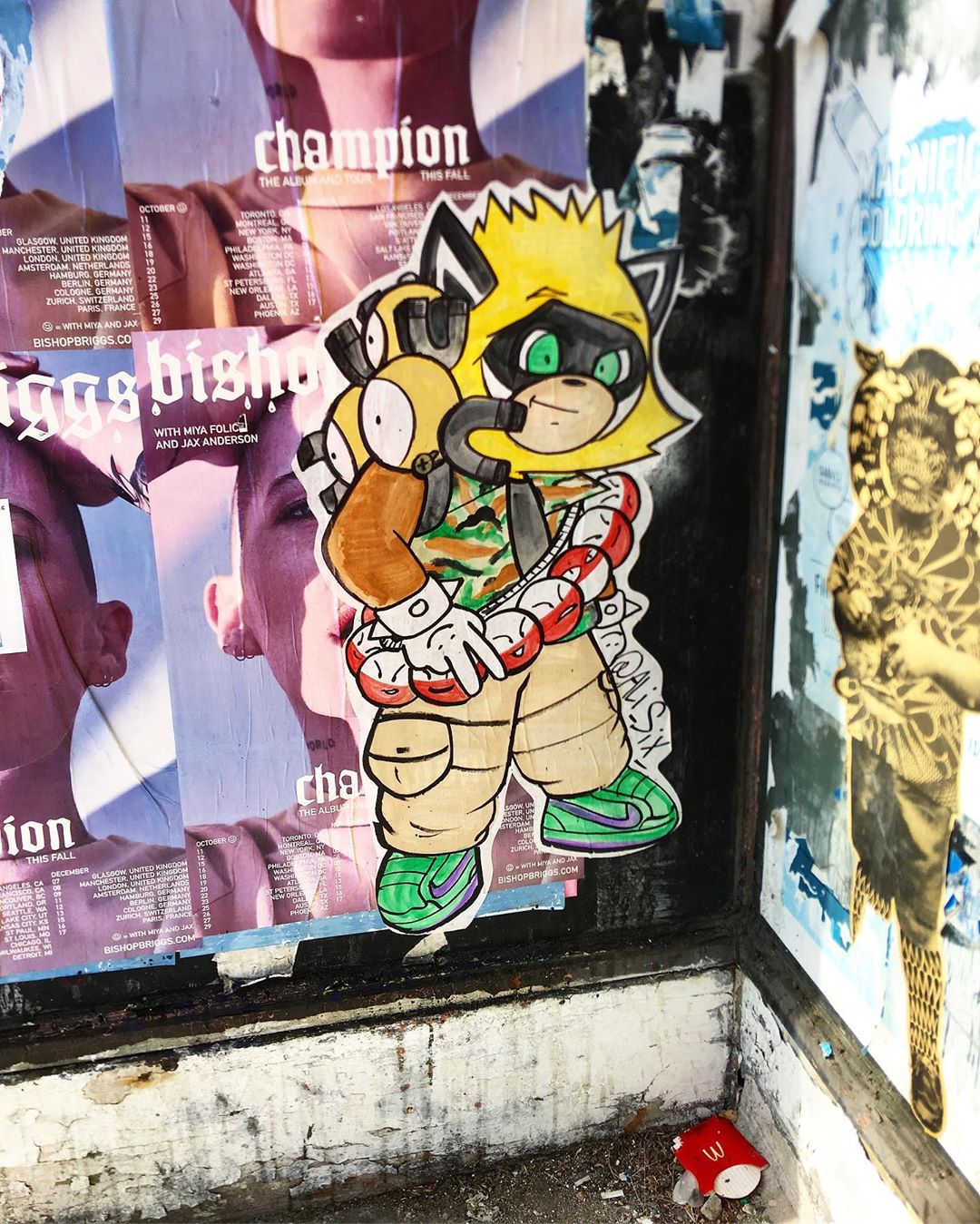
When you’re in the graffiti culture, you’re doing all these pieces for you because you want to challenge yourself — “Can I make these letters look like this?” — but it’s also like I’m flexing for the graffiti culture. I want all these other people who do graffiti to notice like “Yo, I’m really in this shit.” So I kind of took the same marketing that came from graffiti and applied it to my art career that I have today. I’m putting these cartoons all over the streets so that the average citizen can see my character and be like, “Oh man I see that, that’s awesome. That represents optimism and happiness”. I kind of just used the tools of graffiti to get to where I’m at.
With my character, I’m using a lot of wheatpasting in order to advertise illegally. If a cop pulls me over, the difference between what I’m doing with the wheatpasting and the spray painting is I can literally remove the wheat paste character, but if I’m if doing the character with a spray can, you’re automatically arrested. There’s no way you can wash that off. So I took wheatpasting as something that has more longevity for my life with art. With graffiti, I just keep getting arrested. If I get thrown in jail in prison, where is my life at then? I look at where I’m at as more of something I can do as a career and be happy that I’m not working a dead end job or something that’s just takes my life away.
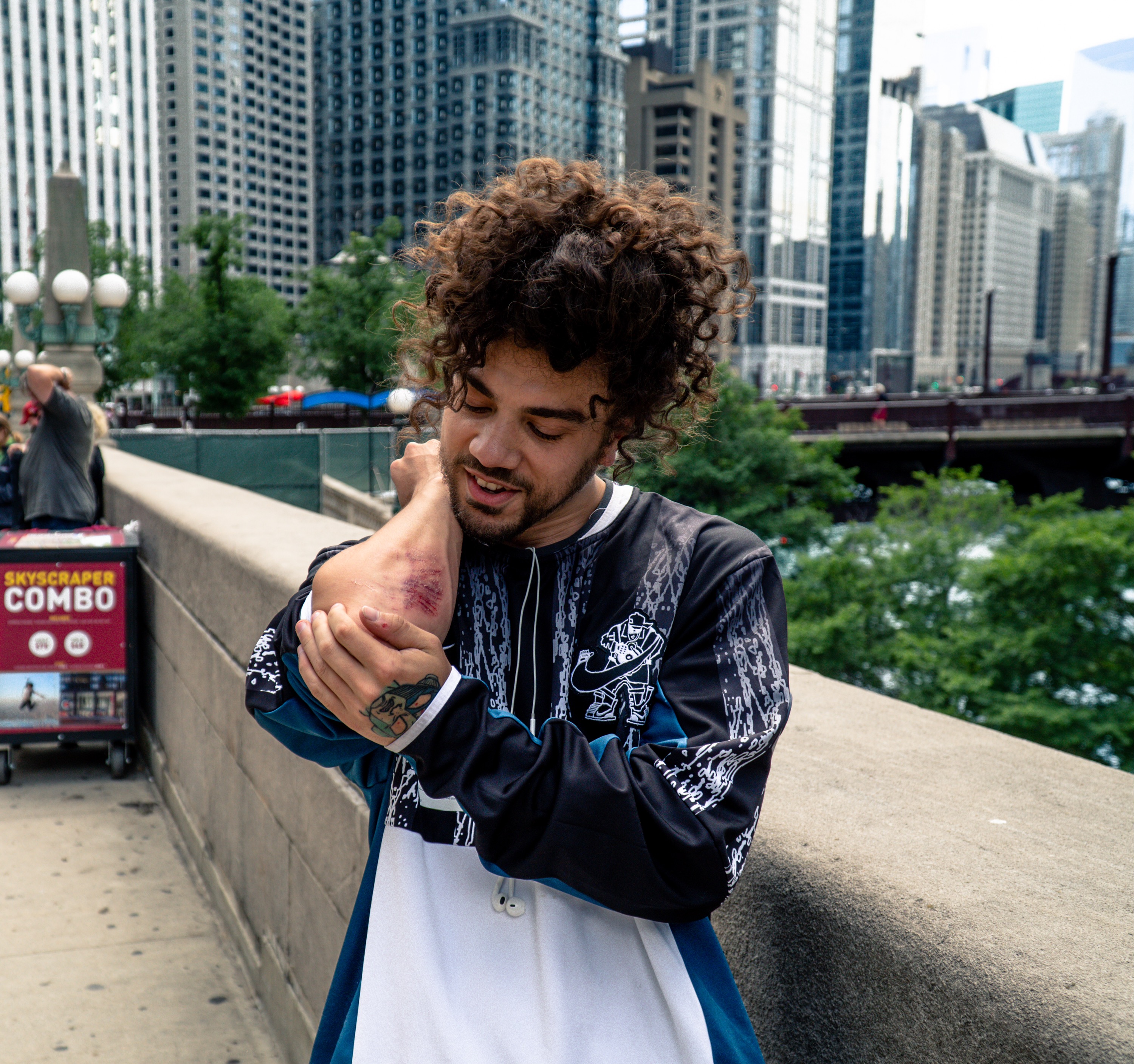
MN: Talk about skateboarding and how it ties into your art.
Ali Six: As hip-hop culture goes, there’s a lot of arts that go with it. I think with graffiti, art, and music, along comes skateboarding and the hip-hop culture from where it started. There’s definitely that attitude and rebellion within the whole hip-hop culture, but you know that’s the attitude that we bring. Since I was a kid watching The Simpsons… I watched it religiously, watching Bart Simpson and all these other pop culture icons, all these little rebellious kids skateboarding, made me really want to pursue that.
My first skateboard came from Aldi actually. My aunt bought me a skateboard at Aldi because I really wanted it and that’s where my love started. I learned how to use that and then my birthday, maybe 3 years later, I asked my other aunt who’s a little bit more wealthy to buy me an actual skateboard and she got it for me. I was the first kid to show up in my sixth grade class with a skateboard, like nobody else skateboarded, but that was just something that I really wanted to do.
It’s always just been that other hobby that I’ve held along with art. I’ve been drawing since I was a kid, so there’s a special place in my heart to just like… learn progression. You learn a lot about yourself with patience, like not everything comes easy, you have to focus. Skateboarding is just that other tie-in to not be bored throughout my day. If I don’t want to do art, I can go and skateboard and I can try and learn something new, rather than just fucking getting drunk or doing drugs or something like that, because I’m not an advocate to be an unhealthy person. I feel like because it gets my blood pumping and because I get the thrill of going off of a stair set or trying a new grind or like learning a new trick or beating homies in a game of skate or even losing in a game of skate, skate has just always been one of my passions.
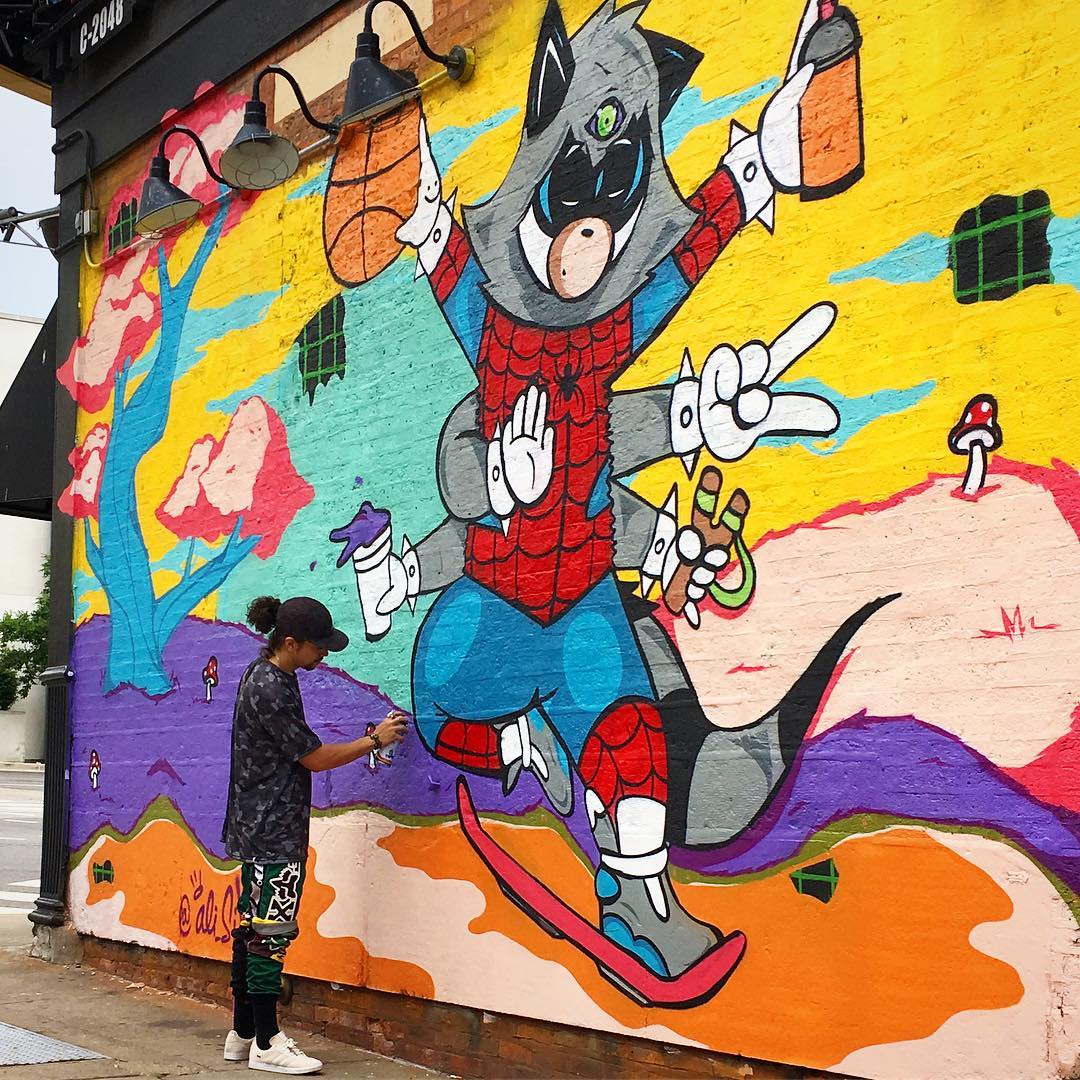
MN: What about basketball?
Ali Six: I’ve been playing basketball since I was a kid. When I was a kid, I was a little bit shorter, so there wasn’t much hope to become a basketball player. However, seeing Allen Iverson when I was a kid… that was like that big push. Like if he could do it, then like other people could do it.
My uncle, who was like my father figure when I was a kid, he played basketball in college, so he already had a hoop in his backyard. Whenever I would go over to his house, he would teach me how to play ball. My older sister played basketball a lot as well. She was on a couple teams.
Basketball has just been something that I’ve always kept as well for my third hobby, along with art and skateboarding. After a couple years of playing ball and skateboarding and doing art, the next thing for me to progress was my handles. Like last year or two years ago, I progressed on my handles and I’ve been able to be king of the court of where I’m around for a little bit, so it’s just nice to feel like I can endure multiple sports and fitness, you know.
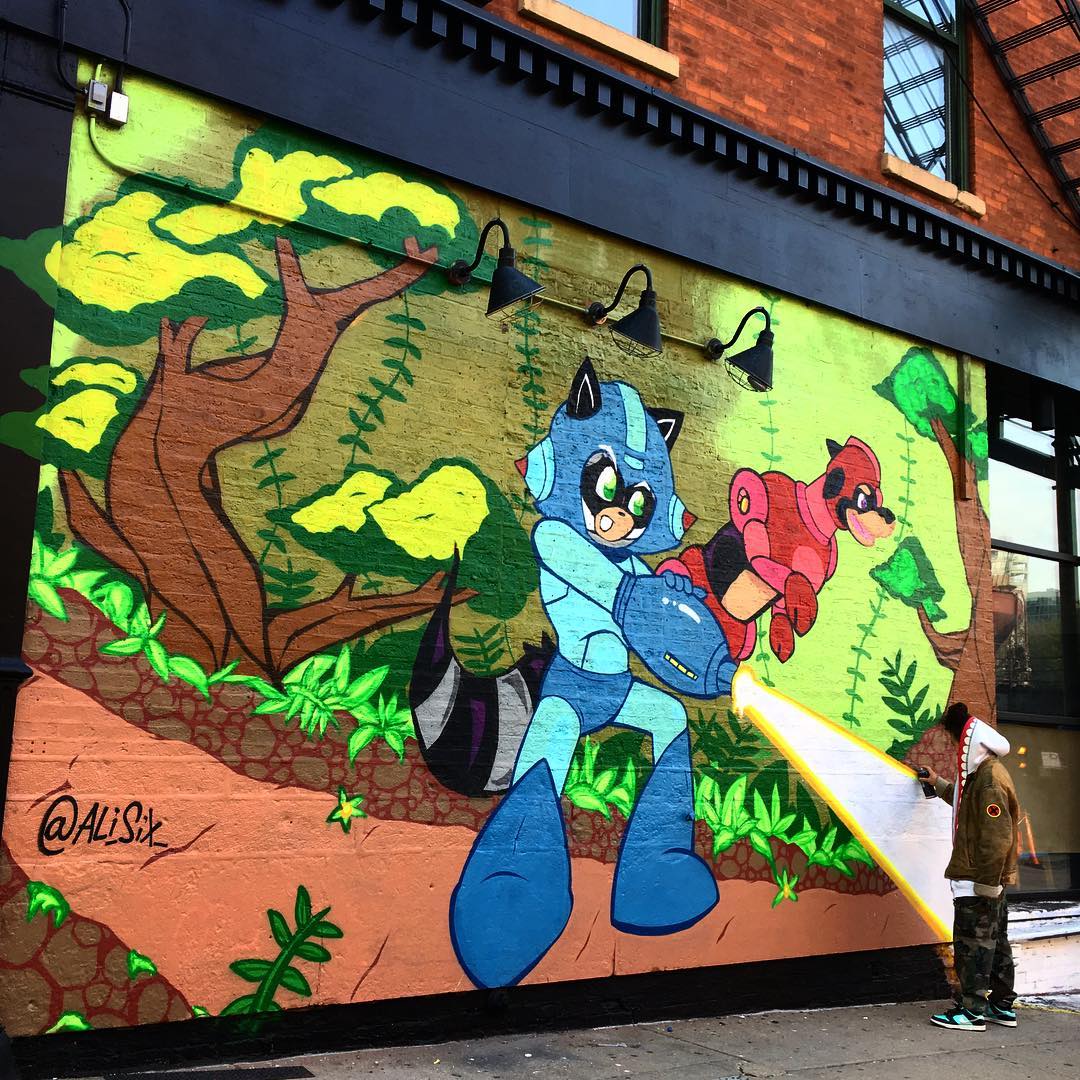
MN: What does being from Chicago mean to you?
Ali Six: I don’t know, to be from Chicago… I don’t know how to say it. I really appreciate being from Chicago in general, but I really appreciate being from the Humboldt Park area. Being Hispanic, there’s a lot of our culture around us in the area and I’ve been around it since I was a kid.
I don’t want to undersell any other city. I feel like there’s so much culture in other cities, but I just don’t know how to compare it honestly or how to explain how being from Chicago is different from anything. We’re not like super material, like corporate in our faces all the time as much as LA or NY, which I’m super happy about. Because like, at the end of the day, none of that shit matters in my opinion. It definitely did when i was younger, like “Oh these clothes and these clothes are dope blah blah blah”, you don’t need any of that shit. You just need to work on something that means something to you, you know. Like I definitely appreciate fashion and I definitely appreciate a lot of different cultures because it’s all art, but like the way it’s just domed down your throat like as if you need that shit by the media… like it’s so weird.
But yeah, I don’t know. I don’t want to be that person to say like “Chicago made me genuine and grit compared to this or that”. You can be that person no matter where you come from. definitely the streets like if someone’s from the suburbs vs. the city i notice a difference just like when im talking to them because they don’t know what I’m saying half the time.